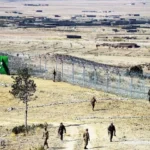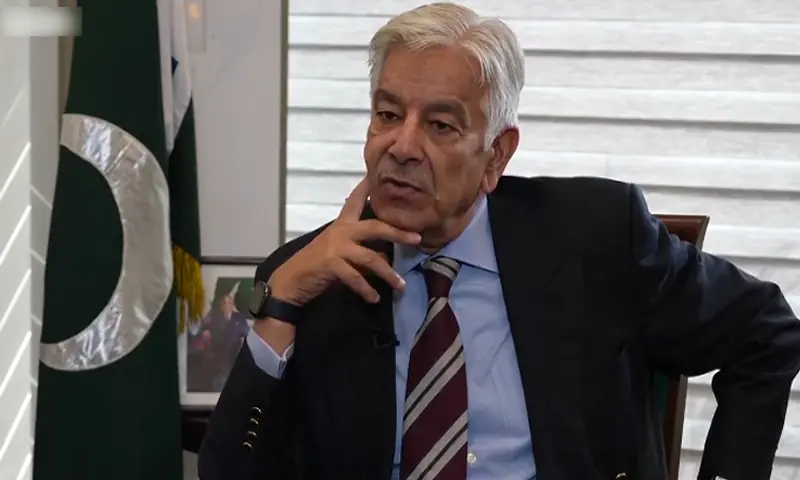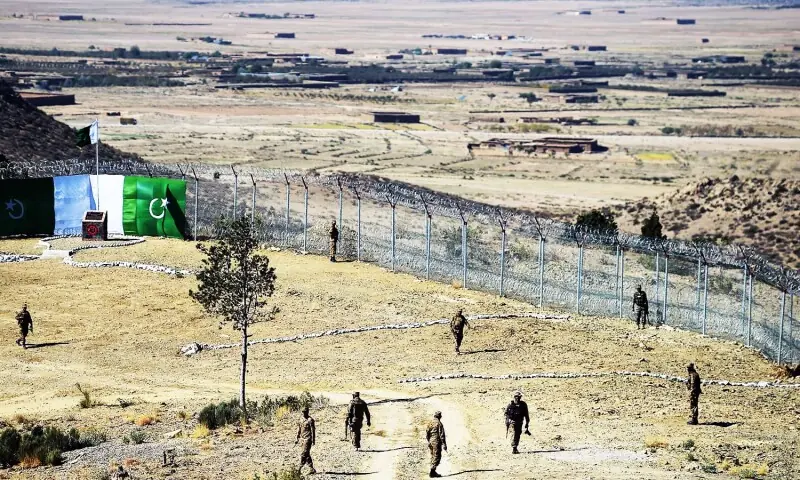Defense Minister Khawaja Asif said on Thursday that a “ray of light” was visible in the Istanbul talks between Pakistan and Afghanistan amid current tensions, and that there was room for “cautious optimism” for a breakthrough, although nothing conclusive could be said at this stage.
Discussions between Pakistani and Afghan Taliban delegations began in Istanbul on Saturday, but Islamabad’s long-standing concern over terror attacks coming from Afghanistan had been a bone of contention, resulting in a stalemate.
Asif today said talks between Pakistan and Afghanistan on cross-border terrorism could resume if Kabul indicated a change in its attitude.
Speaking in an interview about Geographic news On the show ‘Aaj Shahzeb Khanzada Kay Sath’, Asif said that while hope had completely stalled earlier, there are now “some signs”, although he made it clear that he could not say anything conclusive.
Describing how the process of the talks worked, he said different drafts were prepared and when one side accepted one, it was sent to the other side for modification, after which it came back for review.
“Different drafts are being exchanged for an eventual agreement. You can say that there is some ray of light; there is a very cautious optimism. Let’s hope that some form emerges from this.”
“Qatar and Turkiye are highly respected by us and they love us well. Turkiye clearly openly supported us in the Pakistan-India conflict, so we respect them and their opinion,” the defense minister said.
“They brought us (negotiators) from the airport after our hope dwindled during the negotiations. They said, ‘Let’s try this again,’ so some kind of diplomacy is still going on between the two sides and different scenarios are being built.”
Asked whether his optimism referred to a written agreement, the Defense Minister said: “We are not going back, no. Whatever these commitments are, they will be written, witnessed and supported by Qatar and Turkiye; there is no doubt about it.”
Asif said that unlike Pakistan, the Afghan Taliban regime had some dependence on Qatar due to the role the Gulf country had previously played in brokering talks with other nations. Consequently, the leaders of the neighboring country were obliged, to a certain extent, to Qatar and had to give in to it.
The Defense Minister reiterated that any agreement was unacceptable to Pakistan if it was not in writing.
Asked about his previous meeting with the American chargé d’affaires and whether there was any secret US role in the talks, Asif said the issue was not discussed and that “it was a routine meeting… it was a long and pleasant meeting, but politics was not discussed.”
When asked about a possible problem with Afghanistan over the construction of a dam on the Kunar River, the minister refused to say anything other than that Pakistan had “influence” in the matter. “They won’t even be able to do 100 percent of what they’re thinking,” he said.
Asif added that Kabul could not unilaterally deny Islamabad rights to the river by damming or diverting it.
Border skirmishes and failed talks
Pakistan and Afghanistan saw their ties worsen in weeks, including border skirmishes, counter-statements and accusations.
Hostilities began earlier this month when an attack was launched against Pakistan from Afghanistan on the night of October 11. The attack followed an allegation by the Afghan Taliban of Pakistani airstrikes against Afghanistan, an allegation that Islamabad has neither confirmed nor denied.
For its part, Islamabad has long demanded that the Taliban prevent terrorist groups from using its soil against Pakistan. The Taliban, however, deny the accusation of allowing terrorists to operate from Afghan soil.
Meanwhile, Pakistan continues to grapple with the issue of terrorism and has suffered multiple casualties among security forces in intelligence-based operations.
After the initial skirmish on October 11, many others occurred along the Pakistan-Afghanistan border. Meanwhile, the Islamabad attacks also targeted the camps of the Gul Bahadur group in Afghanistan.
Ultimately, the two sides met for talks in Doha, resulting in a temporary ceasefire, as well as a commitment to meet again in Istanbul to work on mechanisms for lasting peace and stability between the two countries.
The second round of talks between the two parties, mediated by Turkiye and Qatar, began last week in the Turkish capital.
But on Wednesday, Tarar announced in a post on X that the latest round of talks between Islamabad and Kabul in Istanbul “failed to achieve any viable solution.” He also stated that Pakistan would continue to take all possible measures to protect its citizens from terrorism.







